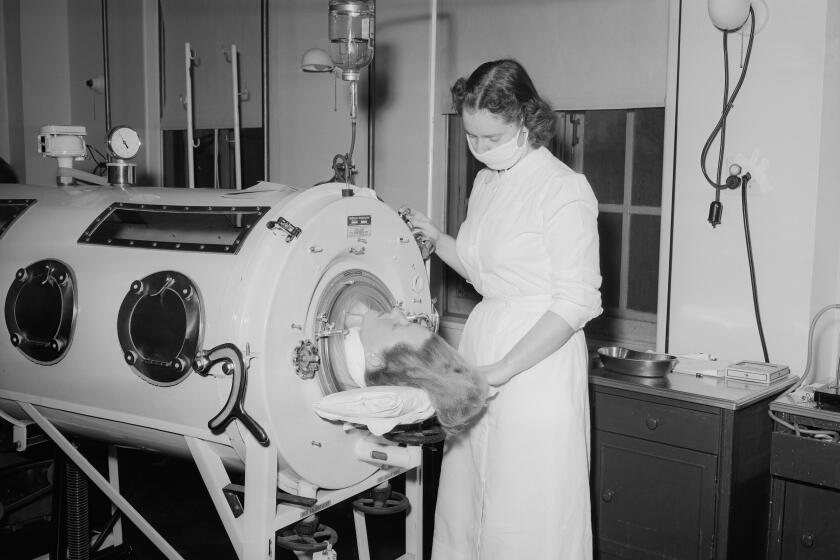Column: How the stars of ‘It Ends With Us’ spawned a universe of legal and PR battles

- Share via
A conflict between Blake Lively and Justin Baldoni, the stars of the movie “It Ends With Us,” has turned into a jobs program for attorneys and flacks.
Lively last month filed a sexual harassment and retaliation complaint with the California Civil Rights Department against Baldoni, her co-star and director; his company, Wayfarer Studios; and a host of others. Her complaint charges, among other things, that Baldoni repeatedly harassed her during intimate scenes — of which there are a bajillion in this flick, based on Colleen Hoover’s mega-best-selling novel about a sweet, malleable flower store owner who falls in love with a charming but abusive neurosurgeon.
Lively alleges that she demanded a long list of precautions, including that an “intimacy coordinator” be present for their scenes and that Baldoni refrain from “biting and sucking of lip” without her consent. Fearful that this news would become public and make him look bad, Lively claims, Baldoni’s team orchestrated a smear campaign against her with the help of a hired gun named Jed Wallace. His company, Street Relations, is accused of orchestrating a social media campaign against Lively that purportedly resulted in a demonstrable deluge of negative stories about her — as measured by a brand marketing company hired by Lively.
Industries such as agriculture and construction rely on unauthorized immigration. But the people who hire undocumented workers rarely face repercussions.
The New York Times subsequently published a bombshell story headlined “‘We Can Bury Anyone’: Inside a Hollywood Smear Machine,” based on thousands of private messages between Baldoni and his team about apparent efforts to “tarnish” Lively after her misconduct accusations. (How did the Times obtain the trove? That is the subject of yet another lawsuit between competing PR firms.)
Separately, the Times published a response from Baldoni’s attorney denying the allegations in full: “These claims,” it said, “are completely false, outrageous and intentionally salacious.”
On New Year’s Eve, Baldoni and others filed a $250-million libel lawsuit against the New York Times alleging it deliberately omitted the true source of the conflict between Lively and Baldoni: “Lively’s calculated and audacious attempt to seize control of the film.” (The movie’s distributor, Sony Pictures, used Lively’s edit of the film and, at the urging of Baldoni and his business partner Jamey Heath, gave her a producer credit. A letter appended to Baldoni’s lawsuit says this was done to keep the peace.) The New York Times vowed to “vigorously” defend itself.
Also on New Year’s Eve, Lively filed a federal lawsuit in New York repeating many of the allegations in her California complaint.
An advisor to Donald Trump’s pick for Health and Human Services, Robert F. Kennedy Jr., petitioned the government to withdraw approval of the polio vaccine.
Baldoni’s attorney told NBC News on Friday that his client plans to sue Lively and reveal “every single text” to prove her account false.
The Hollywood news website Deadline declared that the saga reveals “a slice of how the celebrity PR machine sausage is actually made in the era of influencers and online media.”
At least for now, Lively appears to have won the PR battle. Baldoni was dropped by his agency, WME, which also represents Lively’s husband, Ryan Reynolds.
As a journalist who occasionally writes about Hollywood, I am aware of the unholy alliances between reporters and the Hollywood flacks who tempt them to abandon their ethics in exchange for access and information. (And you can just as easily substitute the word “political” for “Hollywood.”)
According to Blake’s complaint, the crisis PR expert Melissa Nathan wrote that she was friendly with a reporter who writes for People, Fox News, In Touch Weekly and Us Weekly, and that said reporter was “ready to take the story of Blake weaponizing feminism to any of her outlets the minute we give her the green light.”
This struck a nerve with me. Several years ago, I was approached by a high-profile public relations figure who was working for Angelina Jolie during her protracted divorce from Brad Pitt. Would I be interested in writing a column — based on inside information, of course — about how Jolie was being mistreated by a legal system that is stacked against women? The very notion of Jolie — rich, privileged, famous — as a victim struck me as absurd, and I was not the least bit interested in being manipulated into allowing her to, yes, weaponize feminism in her legal battle with Pitt.
But I digress.
Baldoni has positioned himself as an enlightened feminist for years. In 2017, a month after the #MeToo movement exploded into the public consciousness, he delivered a TED talk titled “Why I’m Done Trying to be ‘Man Enough.’”
“Are you brave enough to be vulnerable?” he asked. “Are you strong enough to be sensitive? Are you confident enough to listen to the women in your life?”
In December, during the continuing publicity tour for the movie, he told the Hollywood Reporter that he had endured sexual trauma in college and had “a near breakdown” after filming “It Ends With Us” “because there was so much pain.” He also disclosed that he had been recently diagnosed with ADHD, which, according to Lively’s complaint, he told his publicists could be blamed for his alleged on-set sexual misconduct.
Meanwhile, the film — oh, yeah, the film! — which was made for $25 million, has so far grossed $351 million worldwide.
It seems everyone involved is crying all the way to the bank.
Bluesky: @rabcarian.bsky.social. Threads: @rabcarian
More to Read
A cure for the common opinion
Get thought-provoking perspectives with our weekly newsletter.
You may occasionally receive promotional content from the Los Angeles Times.













